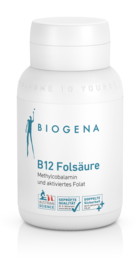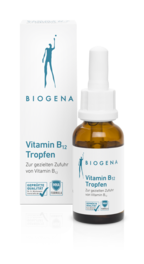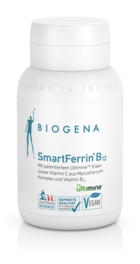Cobalamin or Coenzyme B12 are chemical compounds that are known to most as vitamin B12. It is particularly important for people with a lacto-vegetarian or vegan diet to be informed about this vitamin. What high-quality and vegetable sources of vitamin B12 are there? What role does vitamin B12 play in the human body? Find out everything about this water-soluble vitamin.
We are currently seeing a fundamental shift in attitudes towards vegetarian and vegan lifestyles. More and more people are choosing not to eat animal products – for any number of reasons. While opponents and supporters of a purely plant-based diet continue to battle it out amongst themselves, one thing is becoming increasingly clear: other food trends may come and go, but this development is here to stay. What is more, it is constantly picking up speed and gaining new followers. If you do opt for a purely plant-based diet, however, you need to pay particular attention to one vitamin for the sake of your health: the B vitamin “B12”.
What is vitamin B12?
Vitamin B12 (also known as “cobalamin”) is not an isolated substance but a collective term for several compounds that all have one and the same effect. Also called the “red vitamin” because of its color, B12 was the last of the currently known vitamins to be discovered (in 1926). But this does not make the water-soluble nutrient any less important for human health.
Due to its color, vitamin B12 is also referred to as the "red vitamin".
What do we need vitamin B12 for?
Vitamin B12 acts as a coenzyme in the human body: it helps enzymes do their job. Vitamin B12 thus not only makes an important contribution to cell division, but is also a key factor in energy metabolism, immune defense and healthy homocysteine metabolism. It also helps maintain healthy neural and mental function and is involved in the formation of red blood cells.
Why should we take vitamin B12 with folic acid?
Vitamin B12 and folic acid are team players. They work closely together as an integral part of our metabolism, contributing to homocysteine metabolism and playing an important role in blood formation.* In addition, these two water-soluble B vitamins are also important for a healthy functioning nervous system.
* Vitamin B12 plays an important part in the normal formation of red blood cells; folic acid contributes to normal blood formation.
Where is vitamin B12 found?
Vitamin B12 is an exceptional case among vitamins, because appreciable amounts of it occur only in animal products. Cobalamins are produced by microorganisms and enter the animal organism via various routes. While meat-eating animals are like humans and take in nutrients from their animal prey, herbivores harbor special colonies of bacteria in their digestive tract and/or meet their needs by consuming “dirt”, i.e. soil and microorganisms. Fish are another good source of B12 and generally absorb the essential nutrient via plankton in the water or produce it themselves with the aid of their intestinal flora.
Which foods have a high vitamin B12 content?
As mentioned above, vitamin B12 is only found in sufficiently high quantities in animal products. If you eat meat, fish, eggs, offal and (non-pasteurized) dairy products, it is generally quite easy to cover your daily requirements. Most plant-based foods do not contain vitamin B12. There are some exceptions, such as fermented foods like sauerkraut, kimchi, pickled vegetables, and beer, and foods contaminated by bacteria (e.g. tuber and root vegetables), which may contain traces of various types of B12. Under certain circumstances, however, these compounds are present in a form that our body is unable to process ( “vitamin B12 analogues”) and whose presence may even impede the utilization of useful forms of vitamin B12.
How much vitamin B12 do we need?
Our body does not need large amounts of vitamin B12. According to the German Society for Nutrition (Deutsche Gesellschaft für Ernährung or DGE), just 4 µg a day is sufficient to maintain the vitamin B12 balance in the human body. As is often the case, however, pregnancy and breastfeeding represent exceptions to the rule. The B12 needs of pregnant and breastfeeding women increase to 4.5 µg and 5.5 µg per day. The human organism maintains vitamin B12 stores for times of scarcity. Replete B12 stores contain about a thousand times the amount (4 g) of our daily B12 requirements. However, a constant lack of B12 will deplete these stores in the long run.
What are normal levels of vitamin B12?
A vitamin B-12 level test generally involves measuring the total amount of vitamin B12 in the blood. However, it can take a relatively long time for this value to register a B12 deficiency. Supplies of vitamin B12 may already be low even if the total vitamin B12 value is still within the normal range. Ideally, therefore, other values should also be used. Holotranscobalamin (holoTC), also known as “active B12”, is a laboratory value that indicates a lack of vitamin B12 at an early stage. Low holoTC values indicate a depletion of the B12 stores or a negative B12 balance. Methylmalonic acid (MMA) values can also tell us a lot about our B12 status. In this case, higher values are a sign of empty B12 stores.

Who should watch their vitamin B12 levels?**
Vegans are frequently called upon to keep an eye on their vitamin B12 supply, but vegetarians should be aware their vitamin B12 status as well. Irrespective of diet, there are other groups who also need to watch their B12 levels. These include pregnant and breastfeeding women, the elderly, and people who are prone to disorders of the gastrointestinal tract.
However, an adequate intake of vitamin B12 is not enough to ensure a healthy supply – our body must also be able to utilize the vitamin B12 we ingest. Active absorption of B12 in the small intestine is only possible after it has been detached from the food we eat and bound to a transport protein (this is known as the intrinsic factor and is produced in the cells of the stomach lining). Higher doses of this water-soluble vitamin (e.g. via vitamin B12 supplements) can also be absorbed passively via the intestinal mucosa.
What is a good source of vitamin B12 for vegans and vegetarians?
While ovo-lacto vegetarians can maintain their vitamin B12 balance by consuming animal products such as eggs and dairy products, vegans, lacto-vegetarians and raw foodists may need to pay extra attention to their vitamin B12 intake. In addition to specially fortified foods, vitamin B12 supplements containing the vitamin in natural, utilizable forms can help ensure a healthy daily supply.
If you‘re looking for purely plant-based sources, chlorella is an option. Unlike other types of algae, chlorella contains mainly utilizable vitamin B12 and hardly any B12 analogues. Despite this, chlorella algae are not recommended as the sole source of B12 in a purely plant-based diet since their B12 content is relatively low.
Should you supplement vitamin B12 as a vegan?
While most micronutrients are found in abundance in a vegan diet, there is one vitamin that requires special consideration: vitamin B12 (cobalamin). This vitamin rarely occurs in plant foods, and if so, only in very small amounts. In order to ensure an adequate supply of vitamin B12, vegans are advised to take vitamin B12 supplements or eat specially fortified foods.
Are vegans at risk? Experts around the world are still debating this issue to this day. Without question, however, a profound knowledge of nutrition is an important prerequisite for a properly balanced vegan diet that covers all your nutritional needs. The ideal basis is a varied selection of fruit and vegetables, soya and cereal products, pulses, nuts, grains and seeds. In addition, vegans would be well advised to take a reliable vitamin B12 supplement and make sure that their diet covers their iodine, calcium, vitamin D, iron, omega-3 fatty acids and protein needs.
Which vitamin B12 supplements are suitable for vegans?
The best products for replenishing vitamin B12 stores are those that contain B12 in near-natural, utilizable forms. These include methylcobalamin and adenosylcobalamin, as well as hydroxycobalamin, which can be stored very effectively in the body. If you try to hack a path through the jungle of dietary supplements, you will notice that vitamin B12 preparations are available on the market in an enormous variety of dosages. While 1 µg of vitamin B12 is absorbed actively without involving passive diffusion, a 1000 µg dose of vitamin B12 is absorbed almost exclusively passively. In this case, however, only a fraction of the ingested amount is actually absorbed into the body (~ 10 µg).
When should vitamin B12 supplements be taken?
In order to improve vitamin B12 absorption via the intrinsic factors formed in the stomach lining, the water-soluble vitamin B12 should ideally be taken on an empty stomach or between meals.
Langen RC, Goodbred AJ. 2017. Vitamin B12 Deficiency: Recognition and Management. Am Fam Physician. 2017 Sep 15;96(6):384-389.
Rizzo G et al. 2016. Vitamin B12 Among Vegetarians: Status, Assessment and Supplementation. Nutrients. 2016 Nov 29;8(12):767.
Obeid R et al. 2019. Vitamin B12 Intake From Animal Foods, Biomarkers, and Health Aspects. Front Nutr. 2019 Jun 28;6:93.
Schüpbach R et al. Micronutrient Status and Intake in Omnivores, Vegetarians and Vegans in Switzerland. Eur J Nutr. 2017 Feb;56(1):283-293.
Gallego-Narbón A et al. Vitamin B 12 and Folate Status in Spanish Lacto-Ovo Vegetarians and Vegans. J Nutr Sci. 2019 Feb 26;8:e7.
Selinger E et al. Vitamin B12 Deficiency Is Prevalent Among Czech Vegans Who Do Not Use Vitamin B12 Supplements. Nutrients.2019 Dec 10;11(12):3019.
Watanabe F, Bito T. 2018. Vitamin B12 Sources and Microbial Interaction. Exp Biol Med (Maywood). 2018; Jan;243(2):148-158.
https://www.ganzimmun.de/diagnostik/leistungsverzeichnis
https://www.aerzteblatt.de/archiv/61696/Ursachen-und-fruehzeitige-Diagnostik-von-Vitamin-B12-Mangel
https://www.quarks.de/gesundheit/ernaehrung/vitamin-b12-und-vegane-ernaehrung
https://fet-ev.eu/vegane-ernaehrung











